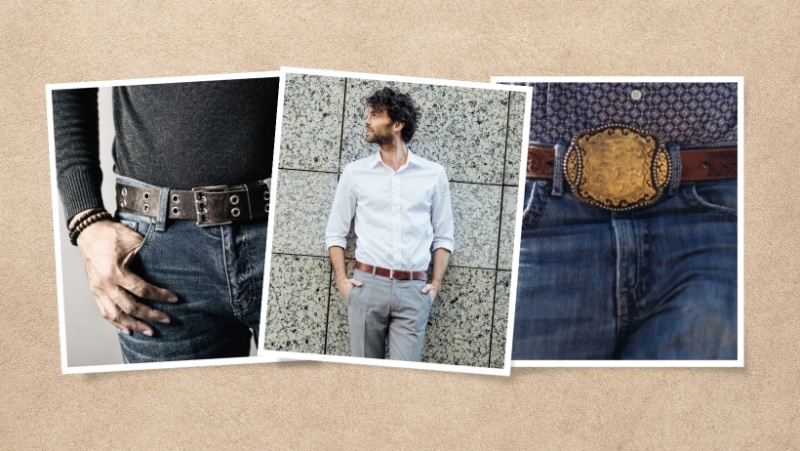
Amid the variety of belt styles, the significance of the belt buckle often goes unnoticed. Yet, this unassuming fastener surpasses its primary role of holding trousers, evolving into a fashion statement.
The array of belt buckle designs is broad and captivating, embodying a distinct allure and purpose. Choices range from the subtle sophistication of a classic tongue buckle to the striking flair of a plate buckle.
Types of Belt Buckles
Exploring the assortment of belt buckles, it’s evident how they cater to diverse aesthetic and functional preferences. The spectrum extends from the sturdy resilience of military buckles to the cutting-edge convenience of magnetic closures.
The influence of the perfect belt buckle is understated yet significant. It can enhance a simple pair of jeans with a touch of refinement or complete the polished appearance of formal wear.
Box Belt Buckle
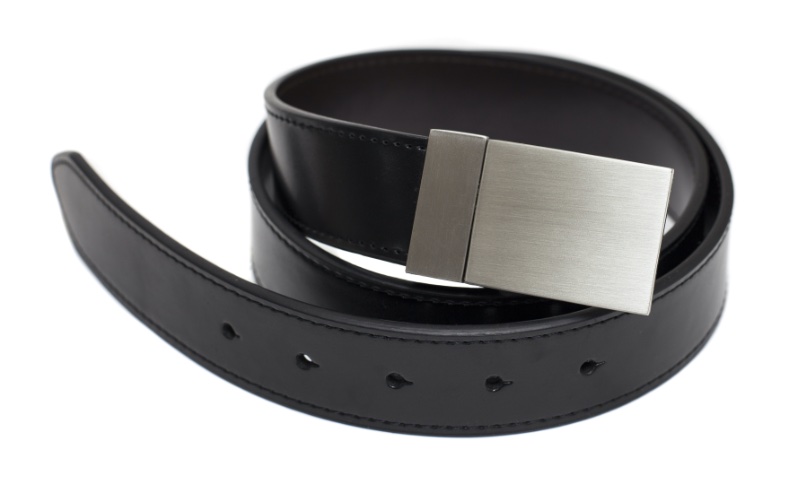
The box belt buckle stands out for its distinct and reliable locking mechanism, which resembles a box-like structure. This buckle usually consists of a frame enclosing a space where the belt strap is inserted and secured.
The fastening mechanism frequently includes a metal bar or a set of teeth within the box that clamps onto the belt, providing a firm hold. This design ensures that the belt stays securely fastened, making it a popular choice for formal belts where a neat appearance is paramount.
Box belt buckles are usually made from metals like stainless steel or brass, offering durability and an elegant finish. The style of box buckles can range from simple and unadorned, suitable for business attire, to more decorative versions that can serve as a focal point of the outfit.
Clip Buckle
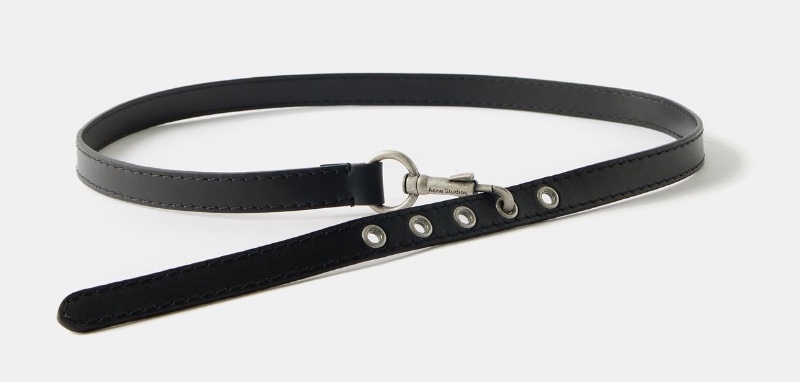
Clip buckles, which include the clamp closure and hook buckle variants, are crafted for quick and secure fastening. These buckles are particularly beneficial for belts needing a firm grip and swift release.
The clip buckle typically features a mechanism where one end of the belt is anchored or clamped into place while the other hooks or clips into the buckle, creating a secure closure. This buckle is often made from sturdy materials like steel or durable alloys, ensuring it can withstand significant use without losing its grip.
The style of clip buckles varies, with some presenting a more industrial appearance suitable for heavy-duty belts while others present a sleeker profile for fashion-forward accessories. These buckles are commonly found in a range of belts, from those used in outdoor and adventure gear to more stylish options that add a contemporary edge to everyday outfits.
Double Buckle
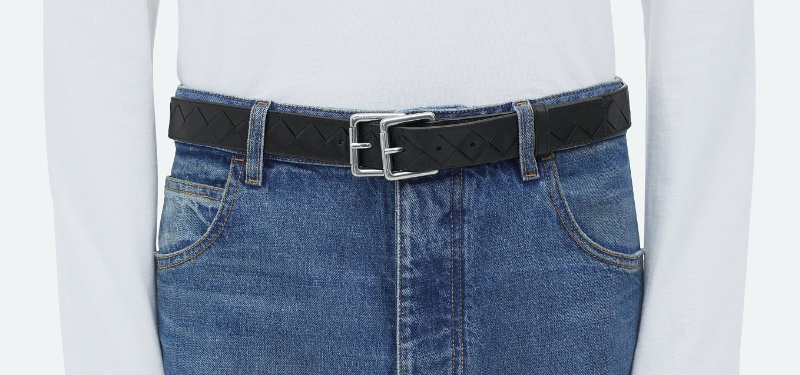
The double buckle introduces a distinctive style to belt design, distinguished by its dual-loop mechanism. This category includes styles like the double ring and anchor buckles, each offering a distinct way of fastening the belt.
In the double-ring buckle, two rings, typically metal, are used to secure the belt strap. The end of the belt is threaded through both rings and then back around one, creating a tension-based clasp that is both secure and adjustable.
On the other hand, the anchor buckle features a loop and a bar, where the belt is looped around the bar for a secure hold. These buckles are generally made from durable materials like stainless steel, brass, or alloy, ensuring strength and longevity.
Flip Top / Flip Closure Buckle
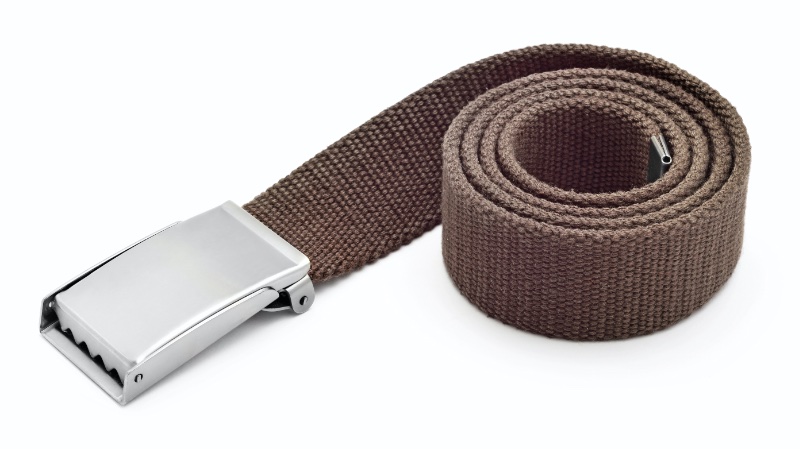
The flip top or flip closure buckle is a practical, uncomplicated belt fastener that offers simplicity and reliability. This design typically features a hinged latch or bar that flips up to open and clamps down onto the belt to secure it in place.
The mechanism is straightforward: when the belt is threaded through the buckle, the flip-top latch is closed over the belt, locking it securely. This buckle is known for its ease of use, making it a popular choice for everyday belts, particularly in casual or workwear settings.
Flip-top buckles are often made from sturdy materials like metal or heavy-duty plastics, designed to withstand regular use and provide a secure hold. Their design is usually minimalistic, focusing on functionality rather than ornate details.
Hoof Pick Belt Buckle
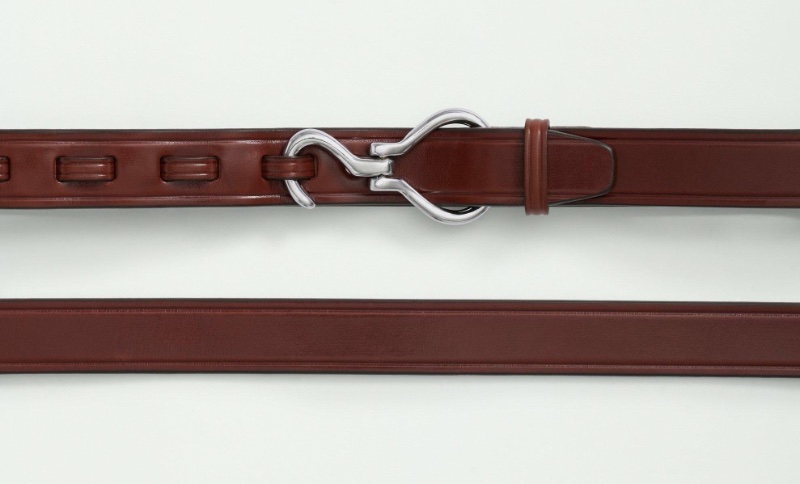
Inspired by equestrian tooling, the Hoof Pick Belt Buckle is reimagined as a stylish fastener. This distinctive buckle, characterized by a hooked shape, is traditionally used to clean debris from a horse’s hoof, symbolizing its functional heritage.
This buckle typically features a metal hook that fits securely into a loop, ensuring the belt remains in place. Its utility-inspired design lends a robust appeal, making it an ideal match for structured attire.
Crafted from durable materials like brass or iron, the Hoof Pick Belt Buckle is built to last. Its design balances ruggedness with refinement, suitable for anchoring both casual denim and tailored trousers.
Magnetic Buckle
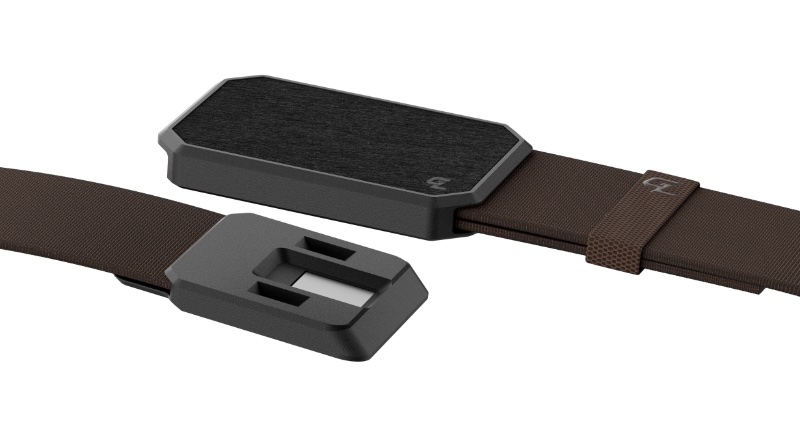
The magnetic belt buckle represents a breakthrough in belt fastening solutions, blending ease of use with a modern aesthetic. This buckle variant utilizes magnets to secure the belt, offering a novel and efficient fastening method.
The magnetic closure mechanism is typically hidden, providing a sleek and seamless look. These buckles are often made from a combination of metals, like stainless steel or alloy, and magnets, creating a sturdy yet stylish fastener.
The appeal of magnetic buckles lies in their simplicity and convenience—they can be easily closed with a simple click and released effortlessly. This makes them particularly suitable for those seeking quick and easy fastening options or individuals with limited dexterity.
Military Buckle
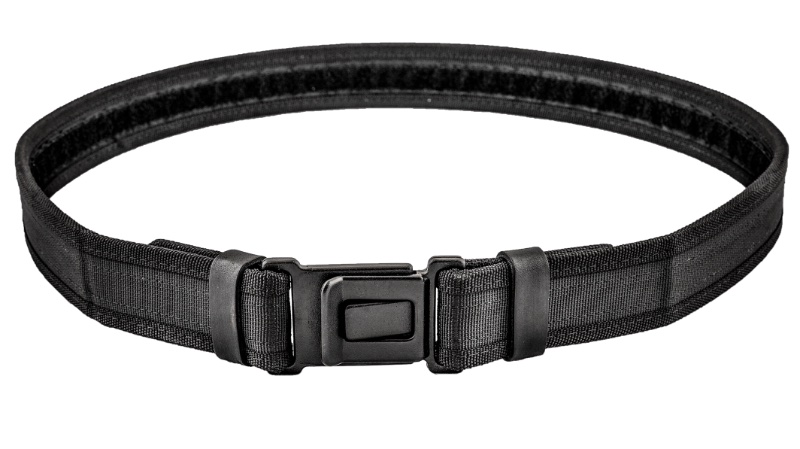
The military buckle is distinguished by its sturdy construction and utilitarian design. Originating from military gear needs, where durability and reliability are paramount, this buckle is built to withstand rigorous use.
Typically, it is crafted from steel, brass, or heavy-duty alloys, ensuring it can endure harsh conditions without faltering. Variations like the tactical buckle and riggers buckle fall under this category, each bringing a unique aspect to the design.
The tactical buckle is often favored for its quick-release mechanism, making it popular for belts requiring strength and efficiency.
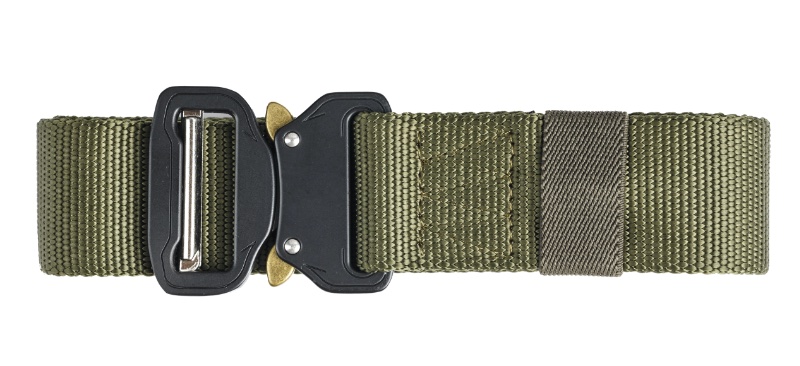
On the other hand, rigger buckles are known for their simplicity and dependability, commonly used in belts that need to bear significant weight or stress. These buckles are not just limited to military wear; they have seamlessly transitioned into the fashion world, bringing a touch of ruggedness to everyday attire.
O Ring / D Ring Buckle
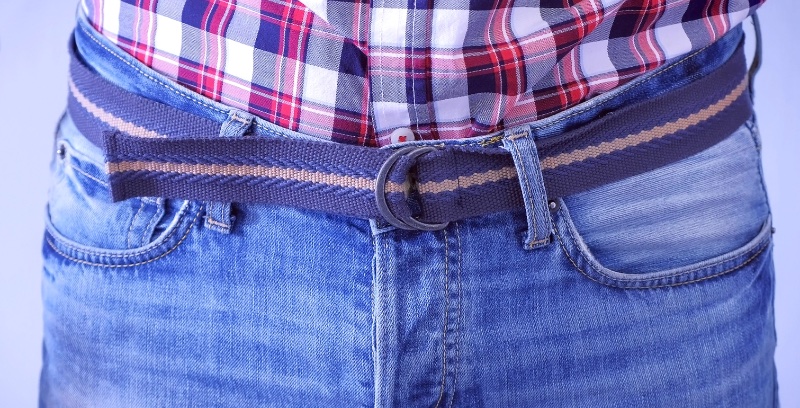
O Ring and D Ring buckles are known for their simplicity and effectiveness and are often used in casual or utilitarian belts. These buckles are characterized by one or more metal rings (shaped like an ‘O’ or a ‘D’) through which the belt is threaded.
The O Ring buckle typically involves two circular rings that the belt loops through, creating a secure and adjustable fit.
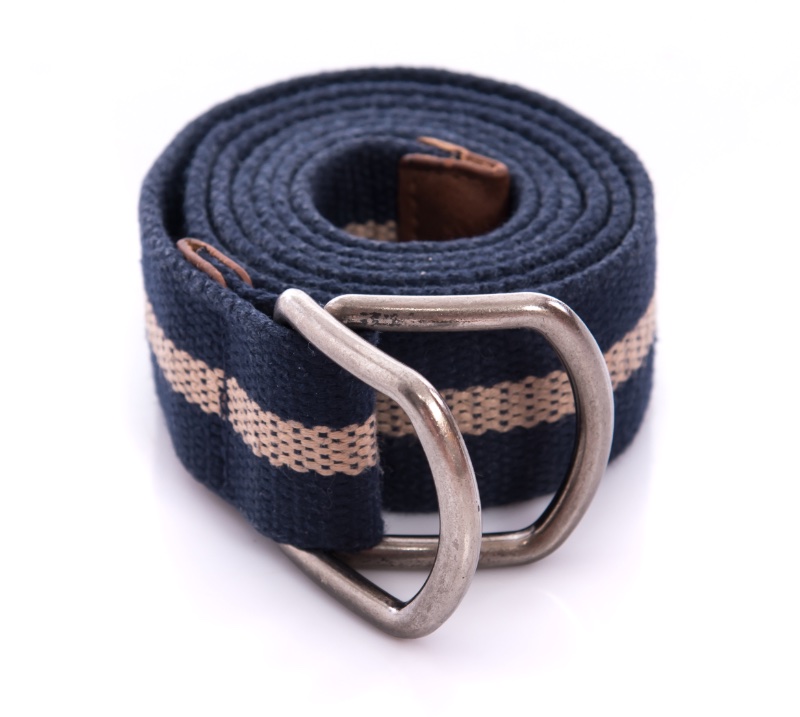
On the other hand, the D Ring buckle usually has two D-shaped rings where the flat side provides stability, and the curved side allows for easy threading of the belt.
Both these styles are favored for their straightforward design and ease of use. They are often made from steel or brass, ensuring strength and durability.
Plate Buckle
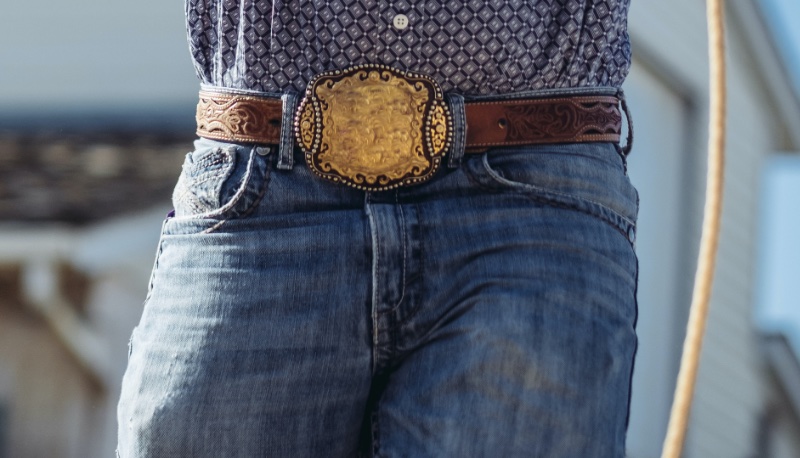
The plate buckle nods to the ornamental design of belt fasteners. This style is characterized by a flat, decorative plate, often showcasing intricate designs or motifs.
Plate buckles are a quintessential element in decorative belts, with the western buckle being a notable variation. Western buckles, in particular, are known for their elaborate engravings, often featuring motifs from nature, such as animals and landscapes, or intricate scrollwork.
These buckles are typically crafted from metals like brass, alloy, or even silver, allowing for detailed artistry and a luxurious feel. It pairs exceptionally well with leather belts, adding a touch of grandeur.
Ratchet Buckle
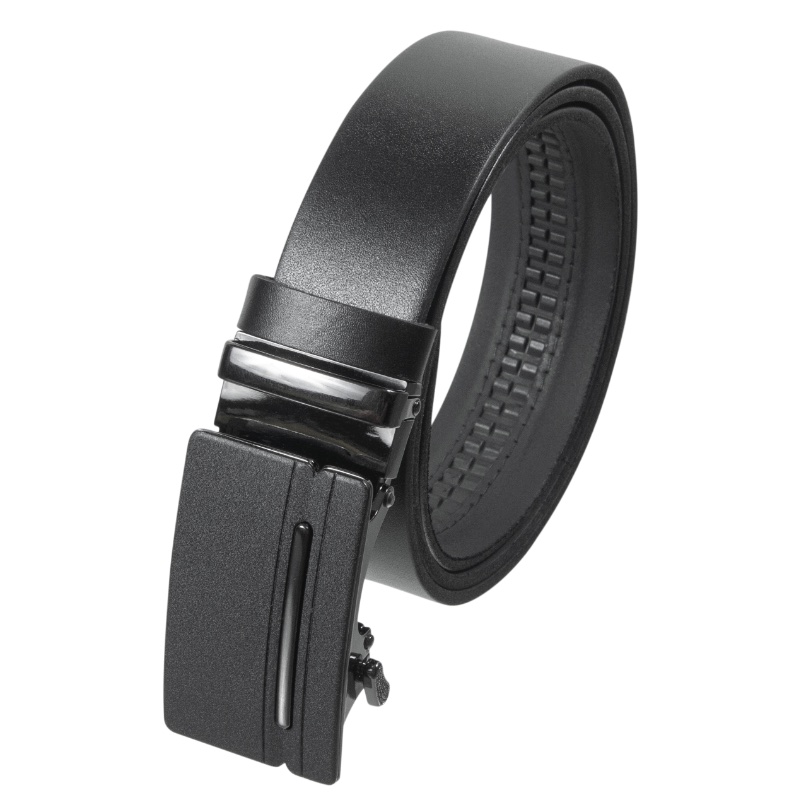
The ratchet buckle represents a blend of modern innovation and sleek design in belt fasteners. Also known as an automatic belt buckle, its defining feature is the absence of traditional holes in the belt.
Instead, it employs a ratcheting mechanism that interacts with a series of teeth on the underside of the belt strap, allowing for a highly customizable fit. This mechanism enables minute adjustments, ensuring the wearer can achieve the perfect tension and comfort without the limitations of pre-set holes.
The ratchet buckle is often crafted from metals like stainless steel or alloy, which lends durability and a contemporary aesthetic. This buckle is typically associated with dress belts and is particularly favored for its clean, minimalistic look that complements formal and business attire.
Reversible Buckle
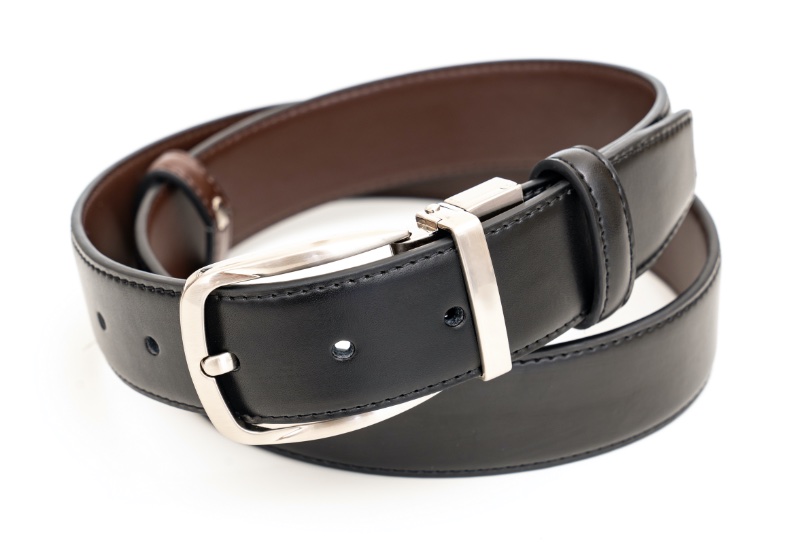
The reversible buckle is a versatile and ingenious solution for those who value flexibility and functionality in their belts. This buckle type is designed to allow the belt to be worn on either side, typically featuring a rotating mechanism that lets the buckle flip over.
This functionality is handy for belts with different colors or textures on each side, essentially offering two belts in one. Reversible buckles are often made from materials like stainless steel or other metals, providing a durable and stylish component to the belt.
Roller Buckle
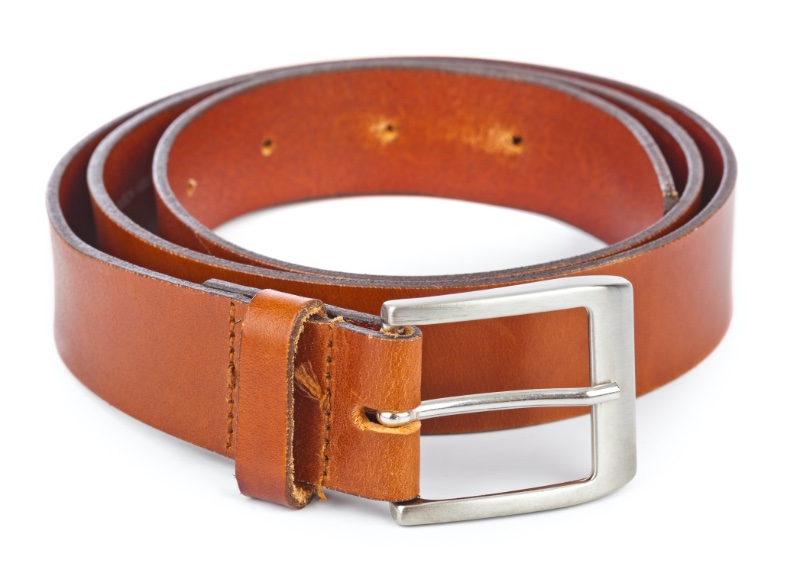
The roller buckle, including the center bar buckle, introduces an element of functionality to preserve the belt’s longevity. Its defining feature is a rolling part, typically a cylindrical bar, that sits at the frame of the buckle and rolls as the belt is threaded through it.
This rolling action minimizes the friction and wear on the belt strap, which is particularly useful for thicker or stiffer materials like leather. Roller buckles are often made from strong metals such as steel or brass, ensuring durability and a smooth operation.
Some roller buckle designs are reversible, offering versatility in style. The aesthetic of roller buckles can vary, with some presenting a rugged and industrial look while others are more refined and polished, suitable for dressier belts.
Screw Closure Buckle
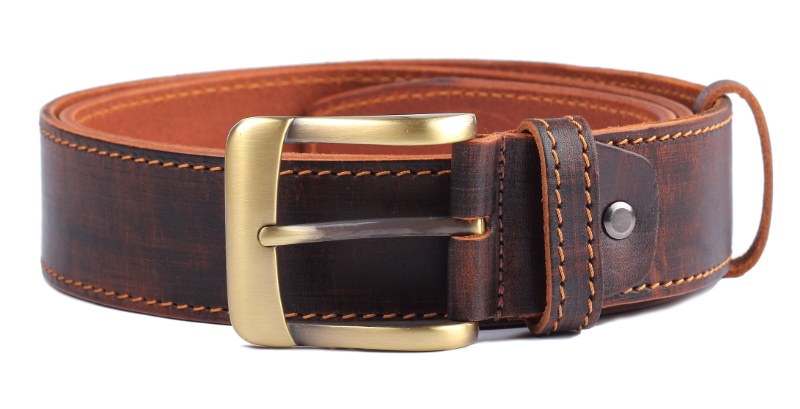
The screw closure buckle is characterized by its distinctive mechanism. This buckle type uses a screw to secure the buckle to the belt, providing a sturdy and adjustable connection.
This design allows for a more personalized fit, as the placement of the screw can be adjusted along the belt to accommodate different waist sizes. Screw closure buckles are often crafted from durable metals such as stainless steel or brass, ensuring both strength and longevity.
The design of screw closure buckles tends to lean towards a more industrial or artisanal look, showcasing the mechanical aspect of the screw as part of the buckle’s aesthetic. It’s a popular choice for custom or hand-made belts, where the buckle can add to the belt’s overall character and uniqueness.
The practicality of the screw closure buckle lies in its ability to provide a secure fastening that is less likely to loosen or shift during wear compared to traditional prong or snap fasteners. This makes it an excellent choice for belts subject to frequent use or for activities requiring a reliable hold.
Slide Buckle
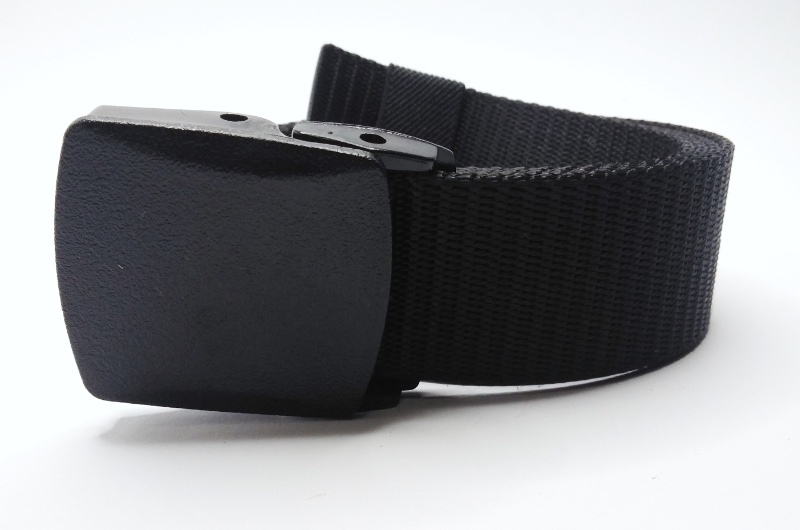
The slide buckle, known as the pinhole buckle, is celebrated for its sleek design and adjustable fit. This buckle type does not rely on pre-punched holes in the belt.
Instead, it features a frame through which the belt strap slides and is held in place by friction or a bar that presses against the strap. This mechanism allows for high adjustability, as the wearer can tighten or loosen the belt to the desired fit.
Slide buckles are commonly used with fabric belts or straps, such as those found in casual wear, outdoor gear, and even certain types of formal wear. The materials used for slide buckles vary, with options including lightweight metals for a more refined look and durable plastics for a casual or sporty appearance.
Snap Buckle
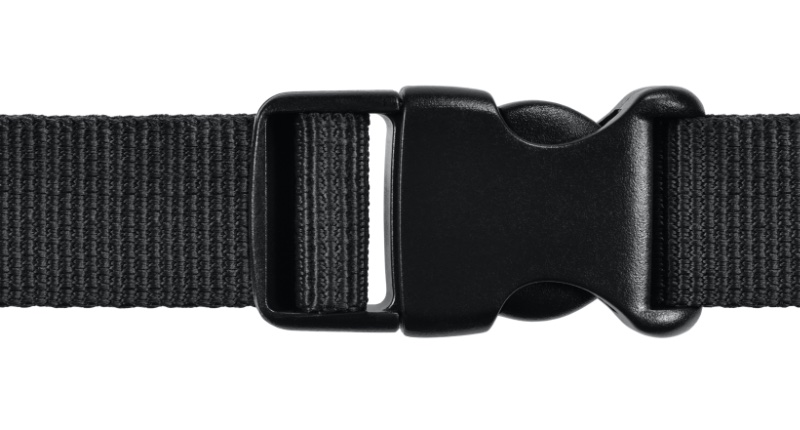
The snap buckle, also known as the side release or quick release buckle, is the epitome of convenience in the world of belt fasteners. Characterized by its ease of use, this buckle type is a staple in casual or sporty belts.
The mechanism involves two interlocking pieces that snap together securely, ensuring the belt stays place effortlessly. To release, simply pressing the sides of the buckle allows for quick unbuckling, making it an ideal choice for dynamic, on-the-go lifestyles.
These buckles are commonly made from lightweight alloys or durable plastics, which balance strength and comfort. The design of snap buckles is typically understated, lending itself well to various casual wear, from jeans and shorts to athletic apparel.
Tongue Buckle
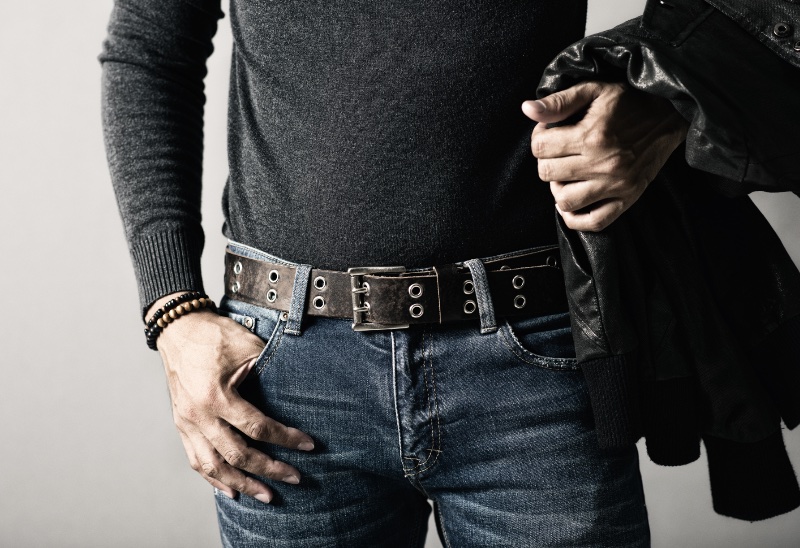
The tongue buckle also called the pin buckle, exemplifies traditional and prevalent usage in belt styling. This buckle type features a simple yet effective mechanism: a pin (or tongue) that fits into holes punched along the belt strap.
Its popularity lies in its straightforward design and reliability. Tongue buckles are typically made from stainless steel, brass, or plastic, catering to various styles and durability needs.
This versatility makes them suitable for everything from formal leather belts to casual fabric and canvas options. The design of the tongue buckle can range from minimalist and sleek for a modern look to more elaborate and decorative for a touch of elegance.
Buckling Up in Style

Belt buckles are functional necessities and significant style statements. Each type of buckle, from the rugged military to the ingenious magnetic, tells a story and serves a purpose, adding depth and character to an outfit.
The right buckle can transform a simple belt into a striking fashion element, elevating casual and formal attire. Whether it’s the classic elegance of a tongue buckle, the rugged charm of a roller buckle, or the modern sophistication of a ratchet buckle, these fasteners help complete a look.
As an accessory that often goes unnoticed, belt buckles deserve their moment in the spotlight, offering an opportunity to express individuality and taste. So, the next time you fasten a belt around your waist, consider the buckle a finishing touch that helps tie an entire outfit together.




